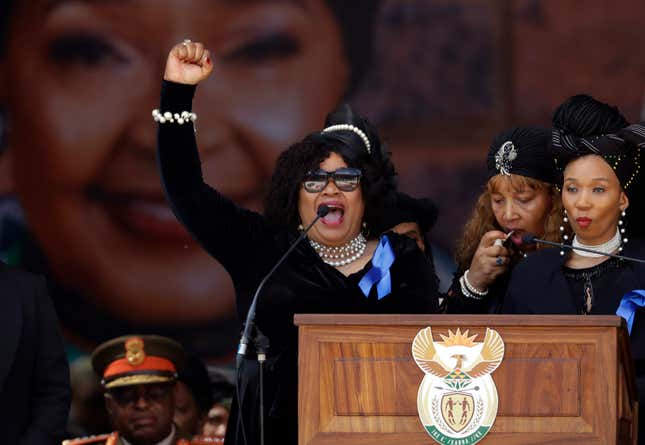
Zindzi Mandela, South Africa’s ambassador to Denmark and the youngest daughter of Nelson and Winnie Mandela, has died at the age of 59, according to the South African government.
Naledi Pandor, South Africa’s Minister of International Relations, commended Mandela for her devotion to the country.
“Zindzi will not only be remembered as a daughter of our struggle heroes, but as a struggle heroine in her own right. She served South Africa well,” Pandor said in a Monday morning statement, shared by CNN.
South Africa President Cyril Ramaphosa also praised Zindzi Mandela’s service to her country, saying the daughter of the republic’s first Black president had “during our years of struggle brought home the inhumanity of the apartheid system and the unshakeable resolve of our fight for freedom.”
The cause of Mandela’s death is still unknown at this time, but a detailed statement is expected to come later today, reports CNN.
Zindzi Mandela came of age during the height of the apartheid struggle. As the BBC reports, during her father’s incarceration on Robben Island, Zindzi and other members of her family “endured years of harassment and intimidation” by the apartheid South African government.
Zindzi was known for being the family member who read out Nelson Mandela’s rejection of conditional release offered by then-president P.W. Botha in 1985. Botha offered freedom to Mandela, who had been imprisoned since 1964, as long as he renounced violence and violent protest. Mandela refused.
Recently, Zindzi Mandela was among those staunchly advocating for radical land reform in the country, writes the BBC.
According to the Nelson Mandela Foundation, Zindzi died on the same day as her older brother, Madiba Thembekile Mandela, who died in a car crash in 1969. Her passing comes just days before the nation is expected to celebrate her father’s birthday on July 18 (Nelson Mandela died in 2013).
The Desmond & Leah Tutu Legacy Foundation released its own statement mourning Mandela’s passing, calling her “a child of the nation,” reports CNN.
With her death, the foundation continued, “South Africa loses an important generational link connecting our divided history to the promise of better, more inclusive, tomorrows.”

